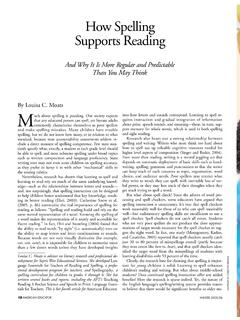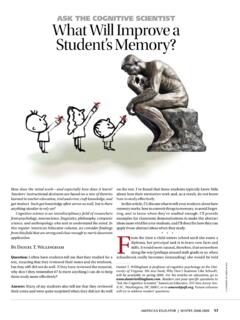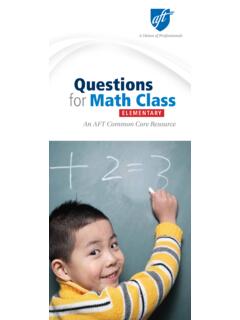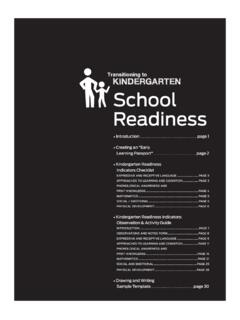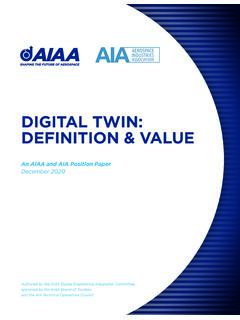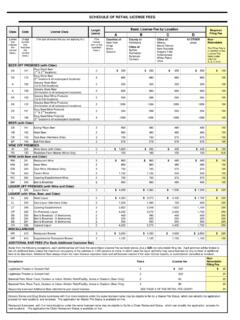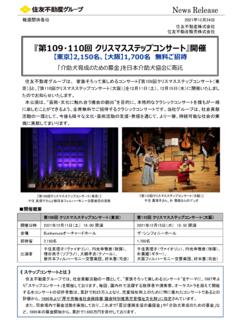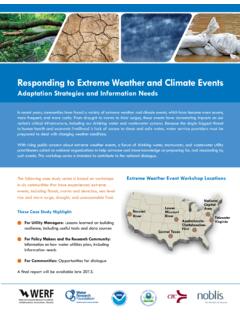Transcription of Ask thE CognItIvE sCIEntIst Why Does Family Wealth Affect ...
1 AmERIcAN EdUcATOR | SPRING 2012 33 How does the mind work and especially how does it learn? Teachers instructional decisions are based on a mix of theo-ries learned in teacher education, trial and error, craft knowledge, and gut instinct. Such knowledge often serves us well, but is there anything sturdier to rely on? CognItIvE science is an interdisciplinary field of researchers from psychology, neuroscience, linguistics, philosophy, computer science, and anthropology who seek to understand the mind.
2 In this regular American Educator column, we consider findings from this field that are strong and clear enough to merit class-room Daniel T. WillinghamQuestion: Why do wealthy kids usually do better in school than poor kids?Answer: Disadvantaged children face a host of challenges to academic success. These challenges fall into two broad categories. First, as one might expect, wealthier parents have the resources to provide more and better learning opportunities for their chil-dren. Second, children from poorer homes are subject to chronic stress, which research from the last 10 years has shown is more destructive to learning than was previously guessed.
3 But research also shows it s not all about money. Common knowledge does not always turn out to be true, especially in matters relating to school-ing. But when it comes to Wealth and educational outcomes, common knowledge has it right: on average, kids from wealthy families do significantly better than kids from poor families. Household Wealth is associated with IQ1 and school achievement,2 and that phenomenon is observed to varying degrees throughout the Household Wealth is asso-ciated with the likelihood of a child graduating from high school4 and attending With a more fine-grained analysis.
4 We see associations with Wealth in more basic academic skills like read-ing achievement6 and math And the association with Wealth is still observed if we examine even more basic cogni-tive processes such as phonological awareness,8 or the amount of information the child can keep in working memory (which is the Ask thE CognItIvE sCIEntIstWhy Does Family Wealth Affect Learning?Daniel T. Willingham is a professor of CognItIvE psychology at the University of Virginia. His most recent book, Why Don t Students Like School?)
5 , is designed to help teachers apply research on the mind to the classroom set-ting. For his articles on education, go to Readers can pose specific questions to Ask the CognItIvE sCIEntIst by send-ing an e-mail to Future columns will try to address read-ers BY dANIEL BAXTER34 AmERIcAN EdUcATOR | SPRING 2012mental space in which thinking occurs),9 or the extent to which the child can regulate his emotions and thought these effects are not due to household income alone. In fact, it s unlikely that they are directly due to income at Imagine showering cash on a low-income Family ; there will not be a sudden boost to the children s cognition or academic achievement.
6 The effects of Wealth must be indirect and must accrue over time. Indeed, researchers believe that a useful way to conceive of the impact of Wealth is that it provides access to opportunities. Money is an obvious enabler of opportunities: cash buys books, and summer enrichment camps, and access to tutoring if it s needed. But in addition to financial capital, two other types of capital afford opportunities for children: Human capital refers to the skills or knowledge of individuals, usually based on their education and experience.
7 Parents who have a good deal of human capital in the form of education will, in subtle and overt ways, impart their knowl-edge to their children. So cial capital refers to beneficial con-nections in social networks, such as ties to people with finan-cial or human capital. Parents with a lot of social capital might have friends or relatives who can provide helpful summer intern-ships for their child, or they might be more likely to have well-placed friends who can advocate for their child if he has a problem at , we d expect finan-cial, human, and social capital to be related.
8 For example, some-one who attends college is increasing her human capital through education, but she will also make friends in college and thus have connections (social capital) with other well-edu-cated That is why, rather than simply measuring Family Wealth , most researchers use a composite measure called socioeconomic status (SES) that includes measures of Family income, parental education, and parental does SES Affect educational outcomes? Most theories fall into one of two categories.
9 Family investment models offer an intuitive mechanism: high-SES parents have more capital, and so can invest more in their children s Stress models suggest that low SES is associated with long-term stress that has two consequences: it makes parents less effective, and it has direct, negative biological consequences for children s maturing brain These models are not mutually exclu-sive. Both could be right, and indeed, there is evidence that both factors contribute to the difficulty that low-SES students have in school.
10 Indeed, much of the challenge in this research is sepa-rating the many factors that can have multiple effects and tend to occur together. For example, crowded housing conditions occur because of lack of financial capital and likely have direct effects on children s learning (it s hard to study in a crowded, noisy environment) as well as indirect effects (crowding makes health problems more likely and leads to greater stress). Despite these challenges, researchers have succeeded in identifying some of the many factors that contribute to the greater academic problems faced by students in low-SES families.





